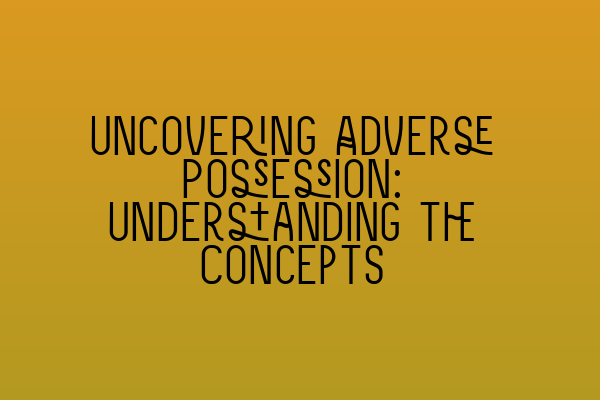Uncovering Adverse Possession: Understanding the Concepts
Welcome to our blog at SQE Property Law & Land Law! In this post, we will dive into the fascinating world of adverse possession and help you develop a better understanding of its concepts. Adverse possession is a legal principle that allows an individual to claim ownership of a property that they have occupied and treated as their own for a certain period of time. It is an intriguing area of property law that often raises questions and debates.
To start, let’s take a closer look at the definition of adverse possession. According to the law, adverse possession occurs when someone who is not the legal owner of a property maintains continuous, exclusive, and notorious possession of that property for a specified period. The exact requirements for adverse possession can vary depending on the jurisdiction, but generally, the individual must openly possess the property without permission from the legal owner, and their possession must be adverse to the owner’s rights.
One important aspect to understand about adverse possession is the concept of time. The duration of continuous possession required for adverse possession can range from a few years to several decades, depending on the jurisdiction and other factors. It is crucial to consult with a legal professional to determine the specific timeframes applicable in your area.
Now, you may wonder what constitutes continuous, exclusive, and notorious possession. Continuous possession means that the occupant must use and maintain the property as if they were the rightful owner without any significant interruptions. Exclusive possession implies that the occupant holds the property solely for their own use, without sharing it with others. Notorious possession requires the possession to be open and notorious, meaning it must be easily observable by the true owner and the general public.
It is essential to note that adverse possession is a complex legal doctrine, and several elements must be met for a successful claim. The land must be physically possessed and occupied by the claimant, who must also have the intention to exclude others from possessing the property. Additionally, the possession must be adverse, meaning it is without the consent or permission of the legal owner.
The idea behind adverse possession is to encourage the productive use of land and prevent disputes over long-abandoned or neglected properties. By providing a legal mechanism for individuals who have treated a property as their own, adverse possession allows for the efficient allocation of land resources.
However, it is important to acknowledge that adverse possession can be a contentious issue, as it involves the potential deprivation of property rights from the legal owner. In many cases, adverse possession claims lead to legal battles and disputes between the claimant and the true owner. These disputes can be intricate and require careful examination of the facts and evidence.
If you find yourself involved in an adverse possession dispute, it is crucial to seek professional legal advice. Our team at SQE Property Law & Land Law specializes in property law matters and can guide you through the complex process of adverse possession claims. We have experience in representing both claimants and property owners, and we can assist you in navigating the legal landscape.
Before concluding, we would like to direct your attention to some related articles that you might find useful:
SQE 1 Practice Exam Questions: If you are preparing for the SQE 1 exam, this practice quiz will help you test your knowledge and gain confidence in your studies.
SQE 1 Practice Mocks FLK1 FLK2: Take advantage of these practice mocks for the SQE 1 exam to sharpen your understanding of key concepts and improve your exam performance.
SQE 2 Preparation Courses: Are you planning to take the SQE 2 exam? Explore our comprehensive preparation courses to ensure you are fully equipped for success.
SQE 1 Preparation Courses: If you are preparing for the SQE 1 exam, our specially designed preparation courses will provide you with the essential knowledge and skills required to ace the exam.
SRA SQE Exam Dates: Stay up to date with the latest exam dates and deadlines for the SRA SQE exams by visiting this comprehensive article.
We hope this blog post has shed some light on the fascinating topic of adverse possession and its concepts. If you have any further questions or require legal assistance, please do not hesitate to contact us at SQE Property Law & Land Law. Our team of experienced solicitors is here to support you in all your property law needs.
